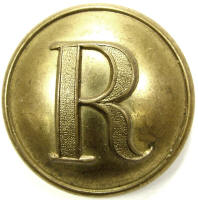
A virtual examination of artifacts of the American Civil War
by Harry Ridgeway
 |
Ridgeway Civil War Research Center, A virtual examination of artifacts of the American Civil War |
| Civil War Artillery | |
by Harry Ridgeway |
| Rifled artillery projectile, Hotchkiss design, Federal manufacture, bursting shell, pattern with flame grooves, pointed nose "common" (standard), lead band sabot, wood time fuze, Ordnance rifle, 3in. Projectile was manufactured in the Federal arsenals following the invention of Andrew Hotchkiss. The pattern consisted of three parts, a nose section containing the explosive charge, a cast iron cup fitted on the bottom, and lead band sabot cast around the middle, on firing the cup would compress the lead band sabot expanding it into the rifling. Some of these shells were "common" or standard rounds, explosive charge only, or "case shot", filled with balls. This shell is a "common" shell, (standard), it does not contain balls, and with a time fuze it was designed to be used against either troops in the open field or enemy cannon. The nose section is pointed, containing an open cavity for the explosive charge only, without a separator bolt. Nose section contains a plugged hole centered on the bottom, presumably this hole was used to secure the core on casting, then a plug was installed to seal the bottom. Three flame grooves were added so that flame from firing would pass through the sabot and ignite the fuze. Hotchkiss patent date was cast, not stamped, into the base, "HOTCHKISS PATENT OCTOBER 9, 1855", and is typically very weak and may have been omitted entirely as the molds wore down or were replaced. Three flame grooves added so that flame from firing would pass through the sabot and ignite the fuze. Fuze employed was a wood time fuze, fuze hole is smooth and tapered, the simple to make fuze could easily be hammered into place, Jones Fuzes pg. 2. Projectile measures: diameter 2.9in., length 6.75in., unfired, 6.5in. sabot compressed from firing, excluding fuze, weight 8lbs., average. Research Center: Artillery4325-Hotchkiss, Ref: Dickey & George, Field Artillery (1993 Edition), pg. 167. Details click: http://relicman.com/artillery/Artillery4325-Hotchkiss.html. |
| A2716... |
| Ridgeway Civil War Research Center, A virtual examination of artifacts of the American Civil War. Artillery Research center, artillery, click: http://relicman.com/artillery/Artillery0000-Index.html. Research center, artillery, click: http://relicman.com/artillery/Artillery0000-Index.html. |
| Civil War Relicman, Harry Ridgeway, Civil War artillery, Relicman sales catalog. Click here: http://relicman.com/artillery/RelicmanSalesArtillery1.html. Artillery for sale: http://relicman.com/artillery/RelicmanSalesArtillery1.html. |